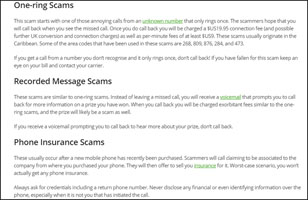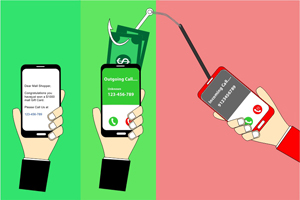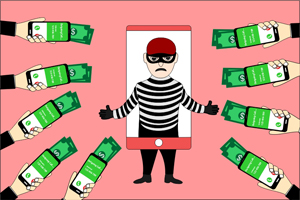Mobile phone scams
Mobile phone scams pose a growing threat in the digital age. Be vigilant against fraud, phishing, and deceptive text messages. Prioritize mobile security to safeguard your personal information and prevent falling prey to evolving telecommunications scams.
Mobile phone scams :
 As technology becomes ingrained in people's lives, scammers also exploit it to pilfer money using similar means. A prevalent method employed by scammers on a
broad scale is the mobile phone scam, commonly referred to as "Smishing." This particular scam is deemed highly efficient, given that nearly every individual
possesses a mobile phone, providing scammers with an avenue to easily access personal information and banking credentials. Stay vigilant against evolving
tactics employed by scammers in the digital realm.
As technology becomes ingrained in people's lives, scammers also exploit it to pilfer money using similar means. A prevalent method employed by scammers on a
broad scale is the mobile phone scam, commonly referred to as "Smishing." This particular scam is deemed highly efficient, given that nearly every individual
possesses a mobile phone, providing scammers with an avenue to easily access personal information and banking credentials. Stay vigilant against evolving
tactics employed by scammers in the digital realm.
The various types of mobile phone scams are listed below:
Subscriber scam :
 Impersonating service center representatives, scammers make phone calls to extract personal information from unsuspecting individuals. Armed with these details,
they adeptly deceive people using your name and information. Stay cautious and be aware of such tactics employed by scammers aiming to exploit your personal
data.
Impersonating service center representatives, scammers make phone calls to extract personal information from unsuspecting individuals. Armed with these details,
they adeptly deceive people using your name and information. Stay cautious and be aware of such tactics employed by scammers aiming to exploit your personal
data.
Cloning method :
 In this scenario, scammers attempt to acquire your mobile identity by cloning your phone number and unique identification number. They then use this information
to make calls to unsuspecting individuals, engaging in inappropriate or deceitful activities. Stay vigilant to protect yourself and others from falling victim
to such deceptive tactics.
In this scenario, scammers attempt to acquire your mobile identity by cloning your phone number and unique identification number. They then use this information
to make calls to unsuspecting individuals, engaging in inappropriate or deceitful activities. Stay vigilant to protect yourself and others from falling victim
to such deceptive tactics.
Lost cell phones :
 This is a highly critical method employed by scammers, involving the unauthorized use of your mobile number to make calls to others. They often fabricate elaborate
and distressing stories, urging individuals to promptly transfer money to the provided account details. It's essential to be cautious and verify the legitimacy
of such requests to prevent falling prey to fraudulent schemes..
This is a highly critical method employed by scammers, involving the unauthorized use of your mobile number to make calls to others. They often fabricate elaborate
and distressing stories, urging individuals to promptly transfer money to the provided account details. It's essential to be cautious and verify the legitimacy
of such requests to prevent falling prey to fraudulent schemes..
Informal text messages :
 Individuals may receive informal messages claiming that their bank accounts have been suspended. Scammers often craft these messages to appear as if they are
legitimate pop-up alerts from the individual's affiliated bank, which supposedly holds their banking details. The message typically provides a contact number,
purportedly the call center's digits, where individuals are instructed to register their complete bank details. It is crucial for recipients to exercise caution
and refrain from providing sensitive information in response to such messages, as they are likely part of a fraudulent scheme.
Individuals may receive informal messages claiming that their bank accounts have been suspended. Scammers often craft these messages to appear as if they are
legitimate pop-up alerts from the individual's affiliated bank, which supposedly holds their banking details. The message typically provides a contact number,
purportedly the call center's digits, where individuals are instructed to register their complete bank details. It is crucial for recipients to exercise caution
and refrain from providing sensitive information in response to such messages, as they are likely part of a fraudulent scheme.
International call routing :
 In this particular scam, individuals often receive calls from mysterious numbers. Upon answering, they may encounter a computer-recorded voice that redirects the
call to an international network, incurring a cost of 20 dollars per minute. This unexpected expense can significantly impact one's mobile payment bills. It is
essential for individuals to exercise caution and refrain from responding to calls from unfamiliar numbers to avoid falling victim to such deceptive practices.
In this particular scam, individuals often receive calls from mysterious numbers. Upon answering, they may encounter a computer-recorded voice that redirects the
call to an international network, incurring a cost of 20 dollars per minute. This unexpected expense can significantly impact one's mobile payment bills. It is
essential for individuals to exercise caution and refrain from responding to calls from unfamiliar numbers to avoid falling victim to such deceptive practices.
Buying second hand phones :
 In this particular scam, individuals often receive calls from mysterious numbers. Upon answering, they may encounter a computer-recorded voice that redirects the
call to an international network, incurring a cost of 20 dollars per minute. This unexpected expense can significantly impact one's mobile payment bills. It is
essential for individuals to exercise caution and refrain from responding to calls from unfamiliar numbers to avoid falling victim to such deceptive practices.
In this particular scam, individuals often receive calls from mysterious numbers. Upon answering, they may encounter a computer-recorded voice that redirects the
call to an international network, incurring a cost of 20 dollars per minute. This unexpected expense can significantly impact one's mobile payment bills. It is
essential for individuals to exercise caution and refrain from responding to calls from unfamiliar numbers to avoid falling victim to such deceptive practices.
How ripandscam help you in this process
If you believe you have fallen victim to a scam, promptly register your complaint on our designated website portal. We assure you that we will respond with effective solutions to address your concerns. Simultaneously, as you monitor the ongoing resolution process, keep us informed of the details, allowing our authenticated privacy members to take parallel steps in addressing your complaint seriously and seeking justice. Our commitment extends to creating awareness among people to empower them in defending against scams.
Common Mobile Phone Scams: Stay Informed and Protected
As technology becomes more integrated into our lives, scammers are finding new and sophisticated ways to exploit it for their gain. Mobile phone scams, also known as "Smishing," have become prevalent, posing a serious threat to individuals' personal information and banking credentials.
- Impersonation Calls: Scammers may pose as service center representatives, attempting to trick individuals into revealing personal details. Once armed with this information, scammers can use your identity to deceive others.
- Mobile Identity Cloning: Scammers may attempt to clone your mobile identity, using your phone number and unique identity number to engage in malicious activities or play tricks on unsuspecting individuals.
- Unauthorized Use of Your Number: In this method, scammers use your authorized account to make calls. They often fabricate sad stories, requesting immediate money transfers to specified accounts.
- Bank Account Suspension Scam: Individuals receive informal messages claiming their bank accounts have been suspended. Scammers, posing as legitimate banks, provide a hotline number where victims are instructed to provide complete bank details.
- High-Cost International Calls: Victims receive calls from mysterious numbers that route to an international network, incurring significant charges. The calls often feature computer-recorded voices, adding to the expense.
- Second-Hand Phone Scams: Scammers install illegal software on second-hand phones without the buyer's knowledge. This software can track user information, compromising privacy.
- Track and Control Scam: Scammers, through illegal software, can eavesdrop on conversations, read text messages, and monitor movements, gaining control without the user's knowledge.
- Bill Padding Scam: Some scammers trick individuals into attending calls routed through international networks, resulting in exorbitant charges reflected in mobile payment bills.
- Used Phone Exploitation: Illegally installed software on second-hand phones allows scammers to access conversations, messages, and track movements, compromising user control.
- Reporting Scams: If you fall victim to a scam, promptly register your complaint on relevant websites. Stay informed about the resolution process and report the incident to trusted authorities to take necessary actions.
How to Stay Safe from Mobile Phone Scams:
- Install reliable anti-virus software on your phone to block access to malware messages.
- Regularly check your mobile bill to ensure it aligns with your usage patterns.
- Avoid providing your number for services, especially those claiming to be free.
- If your phone is lost or stolen, contact your mobile service center immediately to block your number.
Tips to Avoid Falling Victim to Scams
- Safeguard your phone by installing anti-virus software capable of blocking access to malicious messages.
- Regularly review your mobile bill to ensure it aligns with your usage patterns.
- Avoid providing your number to register for services, particularly those claiming to be free.
- If your phone is lost or stolen, promptly contact your mobile service center to block your number.








